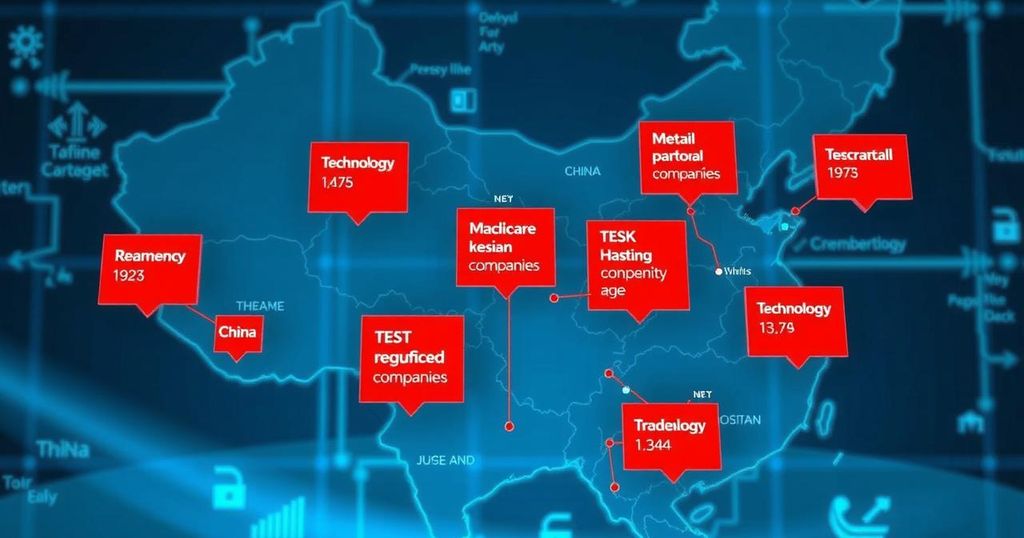Politics
ALEX CAP, ALEX CAPRI, ARTIFICIAL INTELLIGENCE, ASIA, BEIJING, CHINA, DONALD TRUMP, GEOPOLITICS, INSPUR GROUP, JOE BIDEN, MEXICO, MICRO, NATIONAL SECURITY, NORTH AMERICA, NVIDIA, TRUMP, U. S, U. S. DEPARTMENT OF COMMERCE, UNITED STATES, US-CHINA RELATIONS, VENTURE CAPITAL, WASHINGTON
Clara Montgomery
U.S. Imposes Export Restrictions on Chinese Tech Firms to Limit AI Advancements
The U.S. has blacklisted over 50 Chinese tech companies to limit Beijing’s AI and computing capabilities, citing national security concerns. This initiative includes sanctions on entities involved in military technology development and aims to tighten controls on advanced U.S. technologies. The move occurs amid growing tensions with China and reflects a broader strategy to prevent foreign exploitation of American technology.
On Tuesday, the United States blacklisted over 50 Chinese technology companies as part of an initiative to limit Beijing’s advancements in artificial intelligence and advanced computing. The U.S. Department of Commerce’s Bureau of Industry and Security added 80 organizations to its “entity list,” effectively restricting American firms from providing support to these entities without government authorization.
The companies were added to the list due to their alleged actions undermining U.S. national security and foreign policy interests. This move aims to further hinder China’s access to critical technologies including exascale computing and quantum technologies, both essential for processing large datasets and enhancing computational capabilities.
Specifically, dozens of targeted Chinese firms are suspected of contributing to the development of AI, supercomputers, and high-performance chips for military use. Furthermore, 27 entities were sanctioned for procuring U.S. goods to aid China’s military enhancements, while an additional seven firms were identified for advancing quantum technology pursuits.
Included in the sanctions are six subsidiaries of Inspur Group, a cloud-computing company previously blacklisted in 2023. The recent actions represent an expansive strategy targeting additional nations, transit areas, and intermediary organizations that potentially provide Chinese firms access to U.S. technology. Alex Capri, a senior lecturer at the National University of Singapore, discussed the loopholes enabling these acquisitions despite existing restrictions.
U.S. officials anticipate reinforcing efforts aimed at monitoring the illicit transportation of advanced semiconductors produced by companies like Nvidia and Advanced Micro Devices. These expanded export controls coincide with escalating tensions between significant powers, including the increased tariffs imposed by the Trump administration against China.
The rapid emergence of AI startup DeepSeek in China has catalyzed the use of low-cost, open-source AI models, prompting challenges for established U.S. competitors reliant on proprietary models. The Biden administration has enacted thorough export controls that address a comprehensive range of technologies critical to military applications, following the “small yard, high fence” policy designed for selective yet stringent restrictions.
Under Secretary of Commerce Jeffrey I. Kessler emphasized the agency’s commitment to preventing U.S. technology from being employed for harmful military capabilities. He reiterated that the entity list serves as a powerful mechanism to disrupt foreign adversaries from leveraging American technology unethically.
The United States has implemented strict export controls by blacklisting numerous Chinese companies to inhibit their advancements in AI and technology that may compromise national security. This move reinforces a comprehensive strategy to prevent military applications of U.S. technologies by foreign adversaries, amidst rising geopolitical tensions with China. Regulations are expected to become even more rigid as tracking of illicit technology transfer continues.
Original Source: www.cnbc.com








Post Comment